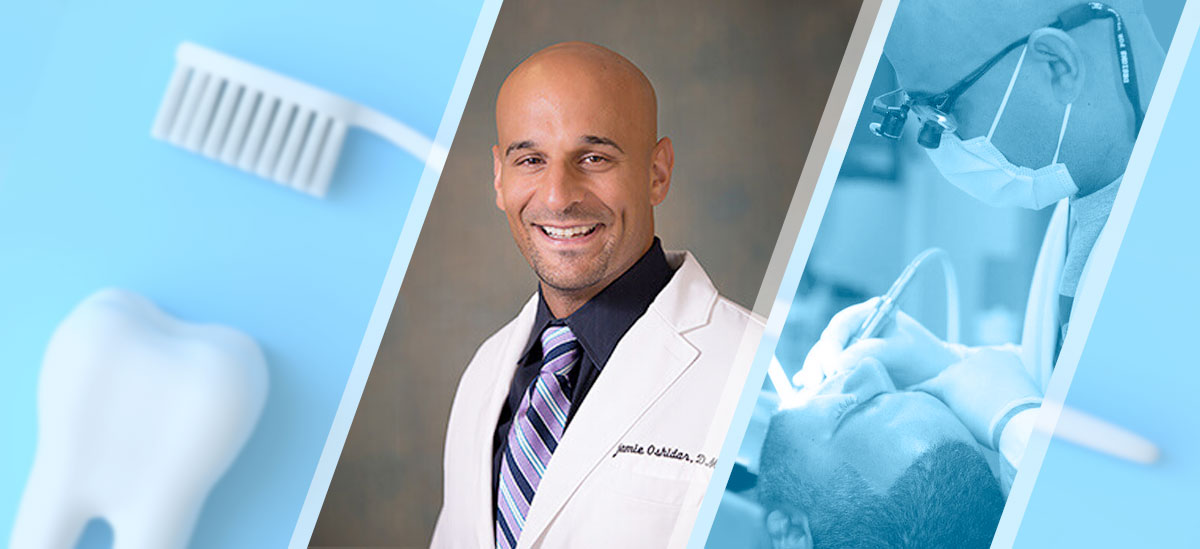
Dr. Jamie Oshidar left the Air Force with a plan to join his brother's dental practice in southern New Jersey—but like many things in entrepreneurship and life, it didn't go quite as expected. Fast forward nearly two decades, and Dr. Oshidar owns Roselle Park Dental & Implants. He's overcome multiple challenges, including the recent pandemic, to build a business and team that's rooted in purpose.
In recognition of Veteran's Day, we interviewed Dr. Oshidar about his entrepreneurial journey, lessons he learned in the Air Force, and why his dental practice's success is about more than making money. The takeaway—his insights as an entrepreneur, veteran, and dentist offer a lot to smile about.
Tell us about how you started Roselle Park Dental & Implants.
My goal was always to be a provider for the family and be there to raise my children. I didn't want to have the necessity of a dual income. So after working in another practice for a few years, I bought an existing practice. I thought I was buying the practice of my dreams, but that wasn't the case. The business wasn't where I wanted it to be. It was also focused on dental implants, and I had never done a dental implant in my life. I went at it full force and became an expert in dental implants. The situation forced me to learn implant dentistry, which ultimately saved my business, launched my career, and allowed me to get where I am today.
What obstacles did you face in those early days of running your practice?
The biggest challenge in anybody's life is themself, and so what had to happen for me was a complete mindset change. In the beginning, I looked at my staff and people that worked for me, and I felt like they were taking from me. Why do I have to pay them? I had some work to do. So I started to read and invest in my own knowledge because, as I realized, owning a dental practice is just a little bit about teeth and a whole lot about being a business owner. I started to understand what it takes to build a business. I began looking at my team in terms of not just what can I get out of them, what can they get out of the dental practice. That's when I started to see a transformation in both the business and the personnel.
What did that mindset of prioritizing your team's well-being and success look like at work?
With my team, I ask them to write down their goals in life. What is important for them? And what's next in their life? We create a level of accountability by understanding what the employees are desiring. That way, when they come to work, they know why they're there—they know what's in it for them. In addition, I challenge my team. I ask for permission to hold them accountable for striving for goals. I want them to recognize that when they do something well in the office, the office benefits, but it's also for them. Once you're able to accomplish that mindset shift, it's really blissful to watch what happens.
You spent eight years in the Air Force. Did you learn anything from that experience that helped you with your business?
The most profound statement that anybody in the Air Force told me happened during my commissioned officer training. The officer leading it looked and me, "Captain Oshidar, you have a very likable personality. So people are going to work for you, and the Air Force is going to love you. But that is also going to be your biggest demise and your biggest problem." I went through a fair amount of hurdles in the business and my personal life, and I realized that I often had unrealistic expectations of people. I'll do a lot; I give, and I push, but I shouldn't expect anything in return because people can't change who they are. It's been a tough lesson to learn in my life, but I've grown from it, and I'm very grateful for it.
What advice would you give other veterans interested in starting their own business?
The first thing I would say is to know what you want. Have a vision. For example, if you take my business, my mission is not necessarily to fix one tooth at a time. My purpose in life is not just to be a dentist. It's for me to help other people become better versions of themself, and I can do that based on my growth and journey. It's not about the money; it's about the purpose. If you approach it that way from the start, you'll create a business and life centered on that larger goal. And when you open up your doors, you can trust yourself and your decisions because they're grounded in that purpose.
You've come a long way from buying the practice that wasn't what you expected. What accomplishment gives you the most satisfaction?
Well, the practice now is rather large, and we're well-known in New Jersey for what we do. I designed a practice that teaches my core values to the people who work there, and I think it's a place of growth for employees and myself. I know I've grown a ton. One of the things I'm most proud of is that we look at our business through the lens of how we can add value to someone's life. We want to do the right thing at the right time and for the right reasons. We don't want to focus on just how much money we can make. Instead, we're doing what we should be doing, and we know why—and that makes for satisfied patients and a happy team.




